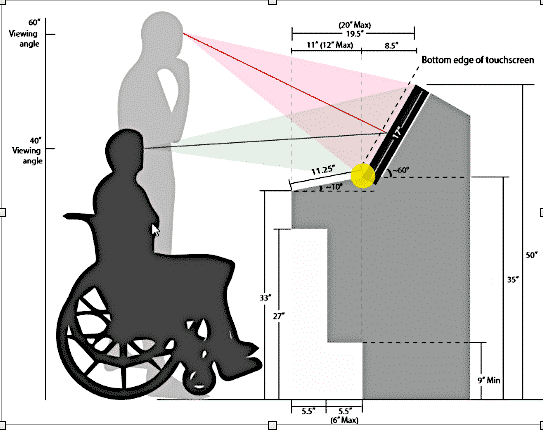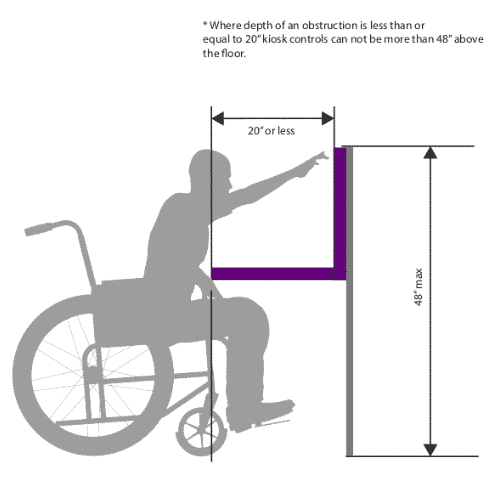
Table of Contents
Guidelines Kiosk ADA Accessibility – August 2020

One of 10 or so diagrams of distance and accessibility for wheelchair users. This is the most common structural regulation along with sight and hearing impaired.
Too often when projects requirements are detailed, ADA and accessibility considerations are often reduced to the simple phrase, “Must be ADA compliant”. This statement is open to definition and inevitably results in range of bids with widely different ADA “compliance”“.
The Kiosk Manufacturer Association has looked at the various ADA regulations in the marketplace and distilled the “kiosk applicable” regulations. There are actually two sets the KMA provides.
-
Current regulations as stated. These are the currently mandated regulations. These have been reviewed by the U.S. Access Board. One of the main future objectives of the U.S. Access Board is harmonizing the U.S. regulations with the European regulations so there is one worldwide standard. The reference docs for this include:
-
ADA 2010
-
Section 508
-
DOT Air Carrier Access
-
Other standards to consider: Canadian standards, WCAG, European EN301-549 as well as EMV, state jurisdictional laws and supplemental regulations such as HIPAA, Medical, UL and more.
-
-
Code of Practice (Going Forward) – taking the existing standards and restructuring them along with adding in some new technology (voice command e.g.) the KMA developed the Code of Conduct going forward. The intent is to have this ANSI certified and referenced by the U.S. Access Board.
-
Definitions and Applicability – A note about other standards – certain kiosks may be subject to additional standards. Examples: Airport kiosks must comply with the standards defined by the Air Carrier Access Act. Kiosks procured for federal contracts (or purchased by some municipal and education customers) must comply with the Revised Section 508 Standards. ATMs 2010 ADA, etc.
-
Functional Performance Criteria
-
Installation & Environment
-
Clear Floor or Ground Space
-
Closed Functionality
-
Biometrics
-
Privacy
-
Standard Connections
-
Operable Parts
-
Software
-
Tactility, Voice Recognition and Speech Command
-
Visual Display Screens
-
Tactilely Discernible Controls.
-
Alphabetic keys
-
Numeric Keys
-
Audible Output
-
Voice Recognition and Speech Command
-
-
-
Recommendations for distribution
-
-
It is recommended that only ‘accessible’ kiosks be installed until 25% of the total kiosk population in any given location, grouping, common purpose or application meet Standards for Accessible Design
-
This minimum kiosk population density applies to owned, jointly owned, leased, shared use, controlled, franchised or operated kiosks or other ICT terminals deployed in public spaces, public amenities and in places of public accommodation or service.
-
To comply with the ACAA Standards for Accessible Design only ‘accessible’ kiosks should be installed until 25% of the kiosk population meets the requirements for Accessible Design.
-
To comply with the ACAA, 25% of the kiosk population, located together for a common purpose(s), in a group, line or other configuration, must be compliant by December 12th 2022
-
-
-
Acknowledgments –
Contributing KMA sponsors – Olea Kiosks, KioWare, Nanonation, Pyramid, Frank Mayer, Vispero, ZIVELO, KIOSK Information Systems, DynaTouch, TurnKey Kiosks, 22 Miles, Peerless AV, Parabit Systems, Qwick Media, LG-MRI, Lexmark, Intel Corporation, AudioEye, PROVISIO, Kiosk Group, OptConnect, CSA Self-Service, Storm Interface, Tech For All, Mimo Monitors, UCP Unattended Payments, OTI Global and Evoke.
Additional Consulted – IMPRESA, TouchPay, Acquire Digital, Self Service Networks, Panel Brite, TTCE, SEKO MedTec, Marathon, CUSTOM, TOKENWORKS, Insight Touch, Microcom, TECA, STEGO, Practical Automation, Ingenico, Esper. IO, Axiohm, TDS TOUCH, Evolis, BOCA Systems, URway Holdings, Alveni, Kiosk Innovations and Apriva. We also recognize multiple retailers, the RNIB (via proxy), NCR Dundee and the University of Maryland for their contributions.
-
For more information
The KMA provides this information in complete form to any and all companies looking to deploy a self-service kiosk project or having deployed a self-service kiosk project. For qualified deployers (state, local and federal agencies) a small administration fee of $249 is the only cost. For manufacturers and vendors there is a separate pricing structure based on company size. Contact [email protected] or call at 720-324-1837.
